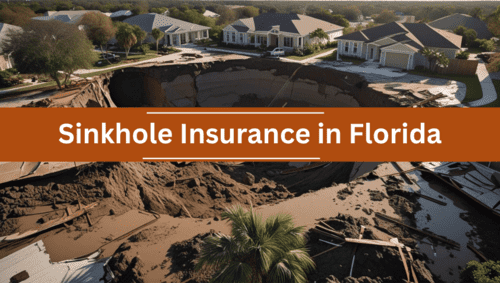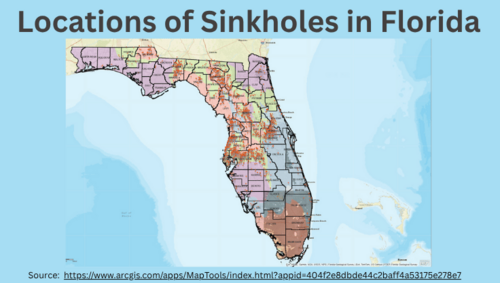Last updated: July 2025

Sinkhole vs. Catastrophic Ground Collapse Coverage in Florida: What Every Homeowner Needs to Know in 2025
Florida is known for sunshine, palm trees, and beautiful coastlines — but beneath all that charm lies something many homeowners don’t think about until it’s too late: sinkholes.
If you're a Florida homeowner, you’ve likely heard the term catastrophic ground cover collapse (CGCC) thrown around in your insurance policy. But what does it mean? And more importantly, what’s the difference between sinkhole coverage and CGCC — and do you really need both?
What Is a Sinkhole? Why Are They So Common in Florida?
Sinkholes form when underground rock—usually limestone—slowly dissolves due to naturally acidic groundwater, leaving behind hidden voids beneath the surface. Florida’s geology, known as karst terrain, is rich in limestone, making the state particularly prone to sinkholes. Florida has more sinkholes than any other U.S. state.
When one of these underground cavities becomes too large to support the ground above it, everything resting on top—such as soil, roads, or buildings—can suddenly collapse and fall into the void, often reaching the aquifer below. This process can occur gradually or without warning, resulting in significant damage to property and infrastructure.
Where Are Florida Sinkholes Located?
A Florida Sinkhole Risk Map

According to data from the Florida Geological Survey, sinkholes are most concentrated in west-central Florida. Areas along the I-4 corridor — including Polk, Orange, Seminole, Pasco, and Pinellas Counties— show some of the highest sinkhole activity in the state.
There's also a noticeable cluster stretching down the northern part of the I-75 corridor from Hamilton County to Polk County, indicating an elevated risk in inland and central regions.
Sinkhole Risk Map: The Florida Geological Survey highlights high-risk areas for sinkholes in Central Florida along the I-4 and I-75 corridors. To view the map in great detail please visit the ARC Map of Florida Sinkholes.
What Is Catastrophic Ground Cover Collapse Coverage?
By Florida law, Catastrophic Ground Cover Collapse (CGCC) coverage is included in every standard homeowners insurance policy. But this coverage only applies if all four of the following conditions are met:
- Abrupt collapse of the ground surface
- A visible depression in the ground
- Structural damage to the home and foundation
- The home is condemned and officially ordered to be vacated by a government authority
If even one of these conditions is not met, your claim will be denied under CGCC.
However, if you purchase optional sinkhole coverage, you may still be protected from sinkhole-related damage—even when it doesn’t meet the full CGCC definition.
What Is Sinkhole Insurance Coverage?
Sinkhole insurance is optional coverage that protects your home from damage caused by sinkhole activity that does not meet the strict CGCC definition. It must be added to your policy by endorsement, and most insurers will require a sinkhole inspection before approval.
What Does Sinkhole Insurance Cover?
Sinkhole insurance typically covers structural damage caused by ground movement that falls short of full collapse, including:
- Foundation cracks
- Shifting or cracking in walls and floors
- Uneven or sloping floors
- Misaligned windows or doors
- General structural weakening
To be eligible for this coverage, the damage must be caused by verified sinkhole activity—even if it doesn’t result in full structural collapse or condemnation of the home.
What’s the Difference Between a Sinkhole and Catastrophic Ground Cover Collapse?
While both involve the ground giving way, sinkholes and Catastrophic Ground Cover Collapse (CGCC) are treated very differently under Florida insurance law.
A sinkhole refers to the actual geological event: a depression or hole in the ground caused by the erosion of underground limestone. Sinkholes can vary in size and may cause minor cracking in foundations, driveways, or walls without fully collapsing a structure.
In contrast, Catastrophic Ground Cover Collapse is a legal insurance term in Florida. It’s only triggered when all four of the following conditions are met:
- There is an abrupt collapse of the ground cover
- A visible depression forms in the ground
- The structural integrity of your home is damaged, including the foundation
- A government agency condemns the building and declares it uninhabitable
If even one of these conditions isn’t met, your homeowners policy won’t cover the damage — even if it was caused by a sinkhole. That’s why optional sinkhole coverage is so important for many Florida
How Do I Get Sinkhole Coverage?
Getting sinkhole coverage in Florida usually starts with a simple phone call to your insurance agent. Ask them if your current carrier offers optional sinkhole coverage and what steps are required to add it to your policy.
In most cases, you’ll need to complete the following:
- Request the endorsement — Let your agent know you want to add sinkhole coverage to your homeowners policy.
- Schedule a sinkhole inspection — The insurance company will likely require a structural inspection to confirm there’s no pre-existing damage. This may be at your expense or split 50/50 with the insurer.
- Get approved — If the home passes the inspection and meets underwriting guidelines, the endorsement can be added.
- Pay the premium — Costs vary by location, but you’ll need to pay the additional premium to activate the coverage.
Not all homes qualify, so it's important to act before any signs of damage appear. Once coverage is denied due to an inspection or visible cracking, it can be difficult to obtain later.
Do I Need a Sinkhole Inspection?
Yes — in most cases, insurers require a professional sinkhole inspection before they will add optional sinkhole coverage to your policy. But it’s important to know that:
- The inspection must be performed by an inspector approved by your insurance company.
- You typically need to contact your insurance agent to get a list of approved providers.
- The cost is usually paid by the homeowner or split 50/50 between you and the insurer.
It’s also important to understand that getting an inspection does not guarantee you’ll qualify for sinkhole coverage. To be approved, the inspector must usually certify that there is no visible cracking or settling in the home’s foundation, walls, driveway, or other structural elements — not even minor signs of movement.
If any damage is found, even if it's unrelated to sinkhole activity, your insurer may deny the endorsement.
How Much Does It Cost to Add Sinkhole Coverage in Florida?
Catastrophic Ground Cover Collapse coverage is automatically included in every Florida homeowners' insurance policy at no extra cost — but it only applies in rare, extreme situations.
If you want broader protection for more common sinkhole damage, you’ll need to request optional sinkhole coverage as an endorsement to your policy. The cost of this additional coverage depends on your location:
- North Florida: Typically starts around $75 per year
- Central Florida: Averages between $500–$600 per year
- High-risk areas (Pasco, Hernando, Citrus Counties): Often $700 or more annually
Premiums are higher in regions with known sinkhole activity, especially along the I-4 and I-75 corridors. Your insurer may also factor in past geological activity, the age of your home, and results from any required inspections.
Let us review your homeowners insurance and make sure you’re protected from what’s below. Click here to contact us or call (904) 268-3106.
Related Articles
- Homeowners Insurance Jacksonville FL
- 4-Point Inspections in Florida: What to Know
- Top 25 Largest Florida Home Insurance Companies
FAQs About Sinkhole Insurance in Florida
Does standard homeowners insurance in Florida cover sinkholes?
Only if the damage qualifies under the strict Catastrophic Ground Cover Collapse definition. Otherwise, you’ll need additional sinkhole coverage.
What is the difference between CGCC and a sinkhole?
CGCC is legally defined and must meet 4 specific criteria. Most sinkhole activity does not meet these standards and isn’t covered by default.
Can I add sinkhole coverage later?
Yes — but you’ll likely need an inspection, and approval isn’t guaranteed.
Is sinkhole insurance worth it?
Absolutely — especially in Central Florida and sinkhole-prone counties. It can save you thousands in repair costs.
About the Author
Susan Augustyniak is the owner of Augustyniak Insurance Group in Jacksonville, Florida. With decades of experience helping Florida families protect their homes, Susan is known for her down-to-earth guidance and expertise in navigating Florida’s complex insurance landscape.

Discussion
There are no comments yet.